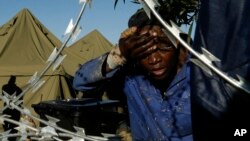South Africa’s defense minister says the government will deploy military personnel to prevent further violence and criminality, after a wave of xenophobic attacks in two cities that have killed at least seven people.
After weeks of violence in impoverished areas of Johannesburg and Durban, South Africa's defense minister announced Tuesday that soldiers will join with police to stop the xenophobic attacks.
The attacks, which began earlier this month, have displaced hundreds of African immigrants and led to hundreds of arrests. Defense Minister Nosiviwe Mapisa-Nqakula described the situation as a “crisis.”
Immigrants from African nations including Congo, Ethiopia, Malawi, Nigeria, Somalia and Zimbabwe have been among the targets of the attacks. Many have sought temporary shelter at makeshift camps, while some African embassies say they are seeing a steady stream of citizens trying to return home.
No details provided
National Defense Force spokesman Brig. Gen. Xolani Mabanga declined to give details of the military operation. He did not say how many personnel would be involved, what the operation would entail -- or even where exactly they would go, though he said they would be sent into “hotspots.”
Those are likely to include the Johannesburg township of Alexandra and the impoverished settlement of Isipingo near the coastal city of Durban.
“The plan is to provide the necessary support as may be required or requested by the South African Police Service in areas where the South African Police Service thinks or deems it necessary that they need the assistance and support from the South African National Defense Force," he explained.
Mabanga stressed that the national defense forces were requested by police authorities, and that they have previously responded to calls for backup, such as during the last round of national elections in 2014.
He also offered a message of encouragement to everyone in South Africa -- wherever they come from.
“I would say to them that I think their safety and security is of concern to the South African National Defense Force," Mabanga said.
Immigrant magnet
Since the end of apartheid in 1994, the nation has been a magnet for millions of immigrants from elsewhere in Africa.
Some critics of the nation’s immigration policy say there are not enough jobs to go around for South African citizens; about a quarter of the population is unemployed.
And many South Africans who were disadvantaged under the unfair apartheid system say they have yet to see the economic equality they fought for, which has led some of them to blame immigrants for their woes.
Even with these harsh conditions, South Africa has been shocked in recent days by images of the brutality shown towards foreign residents.
Brutal attacks
On Saturday, a South African journalist captured shocking photographs of four men stabbing Mozambican national Emmanuel Sithole in Johannesburg. Sithole was attacked just stumbling distance from a clinic, but the clinic's doctor, a foreign national, did not report to work that day because he feared being attacked himself.
The photographer helped Sithole to the nearest hospital, but he died of his wounds. The four men were arrested and appeared in court Tuesday.
The presence of soldiers in poor, mostly black areas is likely to recall a very different era for many South Africans. During the apartheid years, soldiers from the South African Defense Force were heavily involved in policing what were then black-only areas.
That fact may not bode well for the soldiers preparing to go into tense areas.











